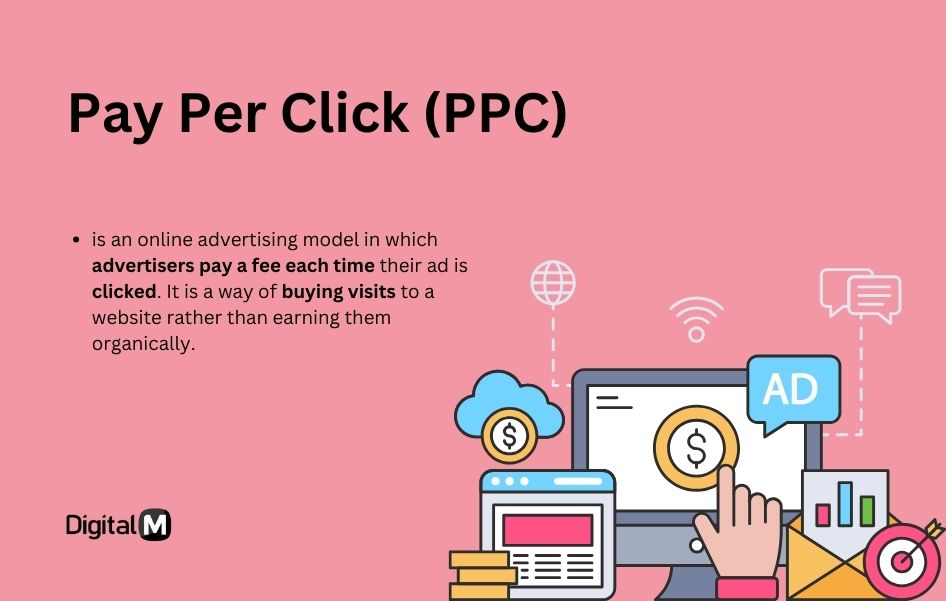Pay Per Click (PPC)
Pay Per Click (PPC) is an online advertising model in which advertisers pay a fee each time their ad is clicked. It is a way of buying visits to a website rather than earning them organically.
PPC is like a shortcut to getting people to visit a website. Advertisers pay a small fee each time someone clicks on their ad, and in return, they get potential customers visiting their site.

Suggested Reads: SEO VS PPC, What Are The Key Differences?
Key Points:
Cost Per Click (CPC): Advertisers are charged a fee only when someone clicks on their ad, hence the name “Pay Per Click.”
Bidding System: Advertisers bid on keywords relevant to their target audience. The highest bidder typically gets the top placement for their ad.
How PPC Works:
Ad Creation: Advertisers create ads that include text, images, or other media to promote their products or services.
Keyword Selection: Advertisers select keywords relevant to their business. When users search for these keywords, the ads may appear.
Bid Amount: Advertisers set a bid amount, indicating the maximum they’re willing to pay for a click on their ad.
Popular PPC Platforms:
Google Ads: Displays ads on the Google search engine and its advertising network.
Microsoft Advertising (formerly Bing Ads): Similar to Google Ads but displays ads on the Bing search engine and its partner sites.
Social Media Platforms: Platforms like Facebook, Instagram, and Twitter offer PPC advertising options.
Ad Auction System:
When a user performs a search or visits a website with ad space, an auction takes place to determine which ads will be displayed. Factors include bid amount, ad relevance, and expected click-through rate.
Conversion Tracking:
Advertisers often use conversion tracking to measure the effectiveness of their PPC campaigns. This involves tracking actions such as a purchase, sign-up, or other desired outcomes.
Example:
A company selling running shoes creates a PPC ad and bids on keywords like “best running shoes.” When users search for this term, the company’s ad appears at the top of the search results. The company pays a small fee each time someone clicks on their ad and visits their website.
Why it Matters:
Instant Visibility: PPC provides instant visibility in search results or on websites, driving traffic to a website immediately.
Budget Control: Advertisers have control over their budget, setting daily or campaign spending limits.
Measurable Results: PPC platforms offer detailed analytics, allowing advertisers to measure the performance of their campaigns and return on investment.
Also read: PPC Advertising in Singapore: Maximising ROI in a Competitive Market
In summary, Pay Per Click (PPC) is an online advertising model where advertisers pay a fee each time their ad is clicked. It provides a quick way to drive targeted traffic to a website, and advertisers have control over their budget and can measure the effectiveness of their campaigns.

